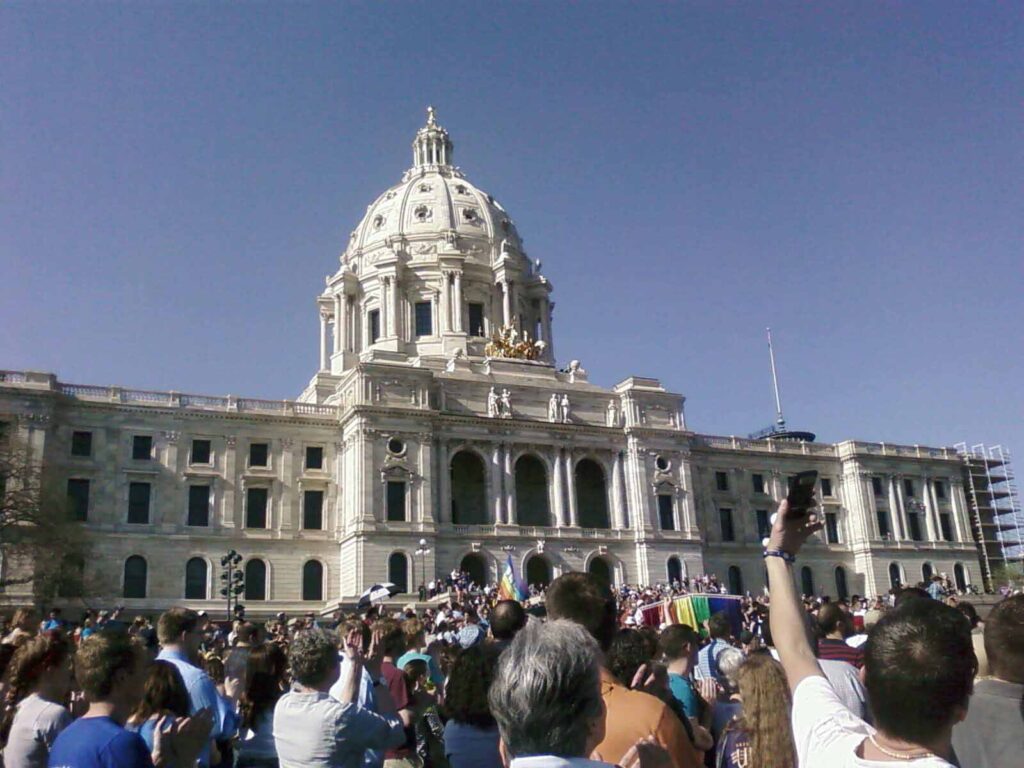“Most students report that they want their post-college lives to be personally rewarding and publicly meaningful.”
What does it mean to live in a democracy? This question confronts all peoples aspiring to a life of liberty, security, and dignity. For those living in a political system committed to realizing those aspirations, it can be broken into two more specific and practical questions:
- What is the nature of our democratic system?
- And how should we, the people, act to sustain its best features and remedy its flaws?
These are hard questions, made harder by deep divisions in American society. But they must be addressed. For that reason, the Minnesota Humanities Center is spearheading a multistate effort to foster civic capacity and address the nation’s deepening civic crisis at a point of major social leverage: the college undergraduate experience. We call it Third Way Civics.

What is Third Way Civics?
Third Way Civics is a one-semester course built around primary source readings (from the era of first contact to the twenty-first century) and student-directed inquiry, deliberation, and action. The course seeks to put Americans’ long history of divisions in context and turn them into opportunities for individual and collective growth: growth among the students who take the course and, by extension, in the peer groups, dormitories, workplaces, hometowns, and other communities they animate and shape through their actions (and will animate and shape in future).
We call it a “third” way approach for two major reasons.
First, Third Way Civics rejects efforts to reduce American history either to a story of glorious triumph or to a litany of unmitigated tragedies. Rather, it asks students to confront our nation’s long and continuing tradition of disagreement: over the purposes and features of self-government, over the general narrative of our collective history and many of its most important episodes, and over the legacies and lessons of the past for the present. The purpose is not to dwell on discord; stories of genuinely creative, collaborative democracy as well as destructive conflict and injustice abound. The purpose is to help students widen their perspectives, foster tolerance and understanding, substantiate their opinions, and challenge others—with courage and compassion—to do the same.
Second, Third Way Civics transcends long-standing arguments over the character and purpose of civic education. It encourages students to value both civic knowledge of history and government as well as civic capacity for collaborative inquiry and action, and to view both types of civic learning as essential to responsible, productive, personally rewarding, and publicly meaningful lives. The pre-class and classroom work, especially, is designed to enhance students’ critical engagement with course texts while also testing, revising, and retesting their conclusions—about the texts themselves and their implications for contemporary public life—through repeated sharing and deliberation with their peers.
What are the goals of the Third Way Civics approach?
Third Way Civics is designed to achieve multiple goals that are often treated as separate or even conflicting.
One major purpose of Third Way Civics, for example, is to meet the desire of students for an education that is not just economically valuable but morally and socially enriching. Most students report that they want their post-college lives to be personally rewarding and publicly meaningful. Sadly, most advanced undergraduates and alums report that their college education fails to support the latter goal.
To address this problem, Third Way Civics helps students relate their personal and professional interests to their core values and complex roles in a pluralistic, interdependent society. It fosters skills of self-reflection, careful listening, perspective-taking, and co-creative work that employers value and reward—and that also make good citizens.
Ultimately, Third Way Civics is designed to help students act as collaborative and productive citizens, equipped and motivated to recognize common interests, formulate common values, and devise common strategies for acting across even deep differences of experience and perspective. Third Way Civics is not meant to be a comprehensive US history or government survey, nor is it intended as a credentialing process for becoming a citizen. It is an opportunity for students to gain knowledge and skills that will foster civic identity and build civic capacities by thinking and acting now like the citizens they are: citizens whose impact on others is a present and significant fact, as well as an eternally recurring and open-ended choice.
Who is involved—and how can my department or institution learn more?
Thanks to generous funders—above all the Teagle Foundation, National Endowment for the Humanities, and the Minnesota State Legislature’s Legacy Funds—the “3WC Community” is ever expanding, especially but not exclusively in Minnesota.
To learn more about Third Way Civics and how to join the 3WC Community, please write MHC Director of Strategic Partnerships Trygve Throntveit: trygve@mnhum.org.
Coordinating Institution
Research Partners
Ball State University Teachers College (Muncie, IN)
Southeastern University American Center for Political Leadership (Lakeland, FL)
Implementation Partners
Ball State University Teachers College (Muncie, IN)
Metropolitan State University College in Prison Program (St. Paul/Lino Lakes, MN)
Minnesota North College (formerly Minnesota State Northeast Higher Education District)
Minnesota State University-Mankato (Mankato, MN)
North Central University (Minneapolis, MN)
Southeastern University (Lakeland, FL)
Southwestern Minnesota State University (Marshall, MN)
Winona State University (Winona, MN)
Thank you for visiting the Minnesota Humanities Center blog.
Any views or opinions represented in this blog are personal and belong solely to the blog author and do not represent those of the Humanities Center, its staff, or any partner or affiliated organization, unless explicitly stated.
All content provided on this blog is for informational purposes only. The owner of this blog makes no representations as to the accuracy or completeness of any information on this site or found by following any link on this site. Omissions, errors or mistakes are entirely unintentional.
The Humanities Center reserves the right to change, update or remove content on this blog at any time
By: Trygve Throntveit
Trygve Throntveit is a Director of Strategic Partnerships at the Minnesota Humanities Center.
